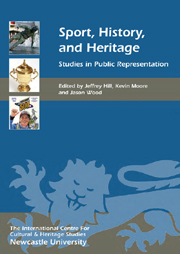Book contents
- Frontmatter
- Contents
- List of Illustrations
- Acknowledgments
- Sport, History and Heritage: An Investigation into the Public Representation of Sport – Editors' General Introduction
- HISTORY, HERITAGE AND SPORT
- 1 Sport, History and Imagined Pasts
- 2 Discredited Class-war Fable or Priceless Promotional Asset? The Duality of Rugby Union's William Webb Ellis Foundation Myth
- 3 Cricket Writing, Heritage and Ideology
- 4 Football and the Fine Arts: The Football Association Art Competition and Exhibition, 1953
- 5 ‘It's Nice to Belong’: Boxing, Heritage and Community in London
- 6 Television and the ‘Austerity Games’: London 1948
- MUSEUMS AND THE REPRESENTATION OF SPORT
- SURVIVALS AND LEGACIES: SPORT, HERITAGE AND IDENTITY
- Afterword: History and Heritage in Sport
- List of Contributors
- Index
- HERITAGE MATTERS
1 - Sport, History and Imagined Pasts
from HISTORY, HERITAGE AND SPORT
Published online by Cambridge University Press: 05 April 2013
- Frontmatter
- Contents
- List of Illustrations
- Acknowledgments
- Sport, History and Heritage: An Investigation into the Public Representation of Sport – Editors' General Introduction
- HISTORY, HERITAGE AND SPORT
- 1 Sport, History and Imagined Pasts
- 2 Discredited Class-war Fable or Priceless Promotional Asset? The Duality of Rugby Union's William Webb Ellis Foundation Myth
- 3 Cricket Writing, Heritage and Ideology
- 4 Football and the Fine Arts: The Football Association Art Competition and Exhibition, 1953
- 5 ‘It's Nice to Belong’: Boxing, Heritage and Community in London
- 6 Television and the ‘Austerity Games’: London 1948
- MUSEUMS AND THE REPRESENTATION OF SPORT
- SURVIVALS AND LEGACIES: SPORT, HERITAGE AND IDENTITY
- Afterword: History and Heritage in Sport
- List of Contributors
- Index
- HERITAGE MATTERS
Summary
Commenting on recent political pronouncements about the need to teach British schoolchildren a more factual, narrative and national form of history, the historian Richard J Evans makes a fundamental point: ‘History is a critical academic discipline whose aims include precisely the interrogation of memory and the myths it generates’ (Evans 2011, 12). Contrary to what many people seem to believe, there is no fixed content to ‘the past’. What we remember and study from the past – in other words, what we construe as ‘history’ – is infinitely variable and, what is more, contestable. The very content and interpretation of history is dynamic, subject to continuing debate and disagreement. Those who like cut-and-dried solutions to problems will find only frustration in a discipline that constantly throws up new challenges to existing ‘truths’.
Paradoxically, what makes the subject yet more problematical is its very accessibility. Unlike some other subjects, history demands relatively few technical skills from those wishing to practise it and enjoy the rewards their labours bring. History's democratic nature is evident in the vast range of public history now available, whether in the form of commercially produced versions (eg television programmes, magazines, historical novels) or in the ‘do-it-yourself ‘ amateur histories composed by all those who make use of local archives of one kind or another (de Groot 2009). The subject has become in itself almost a modern leisure industry, the public (or ‘popular’) output of which far outstrips in volume the history taught and produced in the academy.
- Type
- Chapter
- Information
- Sport, History, and HeritageStudies in Public Representation, pp. 9 - 18Publisher: Boydell & BrewerPrint publication year: 2012



